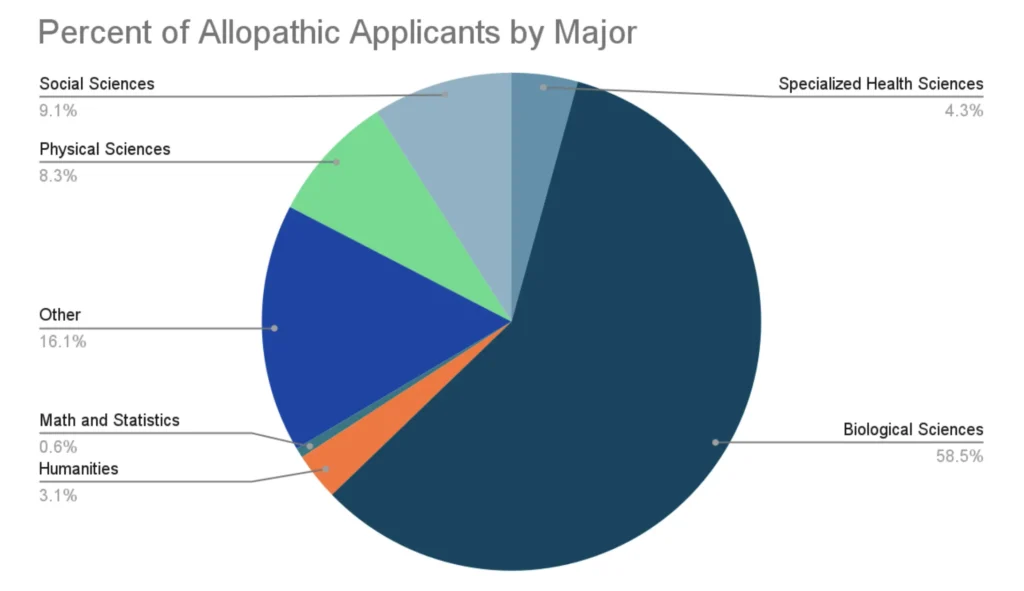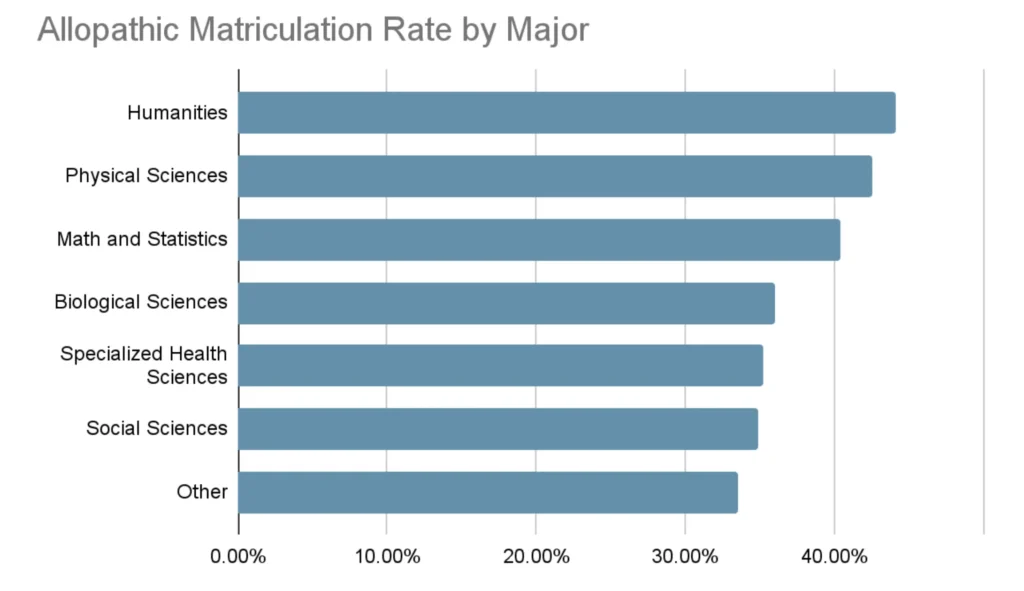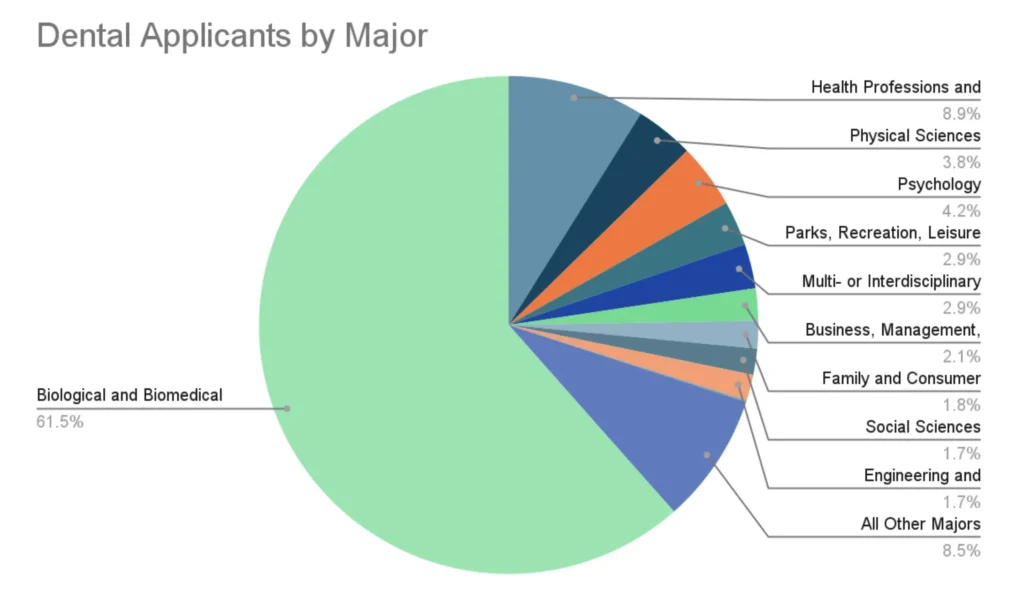Last Updated on November 17, 2022 by Laura Turner
One of the most significant decisions that undergraduate students must make is “what should I major in?” If you are looking to enroll in a health professional school following your undergraduate education, you have the added burden of figuring out how to balance your intellectual interests with what you will need for your application. Your major selection will influence your ability to register for prerequisite courses, prepare for admissions exams, and your future employment, should you decide that a health professional career is not for you. So how do you go about selecting a major?
One option is to look at what other students did. While you should not use other people’s choices as your sole criteria, it can be helpful to see how other students approached the same decision. Let’s dig into the most recent admissions data from some of the major health professional application services.
Most Common Pre-Med Majors
The most common major for medical school applicants is biological or life sciences, representing almost 60% of allopathic medical school applicants and matriculants and 78% of osteopathic applicants. The next most common major for allopathic students is the catch-all “Other” (about 16% of applicants and 15% of enrolled students); for osteopathic students, the next most common major is Social Sciences, with 8.4% of applicants and 6.8% of enrolled students. The Math and Statistics grouping is the least common major among allopathic pre-meds, comprising just 1% of applicants and matriculants. The least common major for osteopathic schools is “No Major,” making up less than 1% of applicants and matriculants.

Why do so many pre-meds major in Biological Sciences? Most students recognize that biology degree plans include the prerequisite courses and the subjects covered on the MCAT (Medical College Admissions Test). However, be aware that over half of all Biology majors end up regretting their choice, according to a Zip Recruiter survey. Students who major in other fields can fit the prerequisite courses and concurrent labs into their schedule as electives. Pursuing a science minor or additional major can help those students access challenging upper-level courses that tend to be in demand or over-enrolled.
Curious about which majors are most likely to be accepted to medical school? Before you scroll down to see the answer, enter your guess in our poll below:
If you guessed one of the sciences, such as Biological Sciences or Physical Sciences – sorry, you are wrong. Humanities majors have a higher chance of being accepted to allopathic medical school (at 44%), while the least likely majored in Other and Social Science. Interestingly, for osteopathic schools, the No Major category performed best, though that comprised only 42 applicants and 14 matriculants, followed by Life Sciences and Other.

Most Common Pre-Dental Majors
Because pre-dental prerequisites overlap significantly with the pre-medical requirements, it should not be a surprise that the majors selected by pre-dental students should also. Over 60% of applicants majored in Biological and Biomedical Science, and about 55% of that group were accepted. The next largest category was Health Professions and Related Programs, with 8.9% of applicants, of which 53% became enrollees. The least common major was Clinical Laboratory Science/Medical Technology/Technologist, at 0.1%. They were also much less likely to be accepted; a measly 16.7% of students with those majors were accepted to dental school.

Generally speaking, applicants to dental school have a better chance at success than their pre-med applicant counterparts, but the dental matriculant data show some interesting differences. Students majoring in Engineering and Engineering-Related Fields enrolled at an eye-popping 66% rate, likely valued for applicable problem-solving skills and creativity in working with their hands in three dimensions.
Other than the Clinical Laboratory Science/Medical Technology/Technologist majors, the least successful applicants to dental school were in the All Other Majors category, at 47% enrolling, followed by Multi- or Interdisciplinary Studies majors at 50%.

Most Common Pre-Pharmacy Majors
The American Association of Colleges of Pharmacy breaks down applicant information in great detail rather than aggregating the data as the medical and dental associations do. Students major in a wide variety of topics as they prepare for pharmacy school, from Accounting/Finance (20 accepted applicants) to Zoology (7 accepted applicants). As might be expected from a profession that focuses on the interaction between humans and different compounds, the most common majors are Biology, with 2484 accepted applicants making up about 21% of the accepted applicants, followed by Pharmacy (1543 accepted applicants, about 13%) and Chemistry (1070 accepted applicants, about 8.9%).
Applicants to Pharmacy school are relatively likely to be admitted, especially in comparison with their premedical and predental peers, with 88.6% of applicants accepted in the 2020-2021 cycle. This acceptance rate has grown significantly over the past twenty years. In the 2003-2004 cycle (the oldest with data available), only 34.1% of applicants were accepted.
Most Common Pre-Optometry Majors
Looking at data from the Association of Schools and Colleges of Optometry, the vast majority of optometry applicants majored in Biology, Biological Sciences, or Biomedical Science; these majors made up over 70% of applicants. The remaining 30% were spread primarily across social and physical sciences, such as Chemistry, Biochemistry, and Psychology with only about 2.8% majoring in Other fields of study.
Similar to Pharmacy, students seeking an OD degree are more likely to be accepted than students seeking an MD, DO, DDS, or DMD degree. In the 2020-2021 cycle, 74% of optometry applicants were accepted. Unlike in pharmacy, however, this percentage has remained fairly stable over the past ten years; in the 2009-2010 application cycle, 67% of optometry applicants were accepted, and this percentage has fluctuated between that low and a high of 79% in both the 2018-2019 and 2019-2020 application cycles.
Limits in Interpretation
These studies usually ask participants to describe the category that best matches their undergraduate degree. While most respondents are traditional undergraduate applicants, many non-traditional applicants may contribute to the representation of non-biological science majors in these data as their first bachelor’s degree may have been in a different area. You should also be careful not to conclude that applicants are accepted – or conversely not accepted – only because of the major they pursued.
In addition, many undergraduate institutions offer multiple biological science degrees, including different degrees for molecular/cell biology and evolutionary/environmental biology. Many programs offer multidisciplinary degrees such as “neuroscience” that overlap psychology and biology coursework or “bioengineering.”
Academic and Prehealth Advising
Incoming undergraduate students should not rush to decide on a major. Instead, you should take the time to talk with academic advisors about degree plans and sequencing pre-health coursework. For those without advanced college credit, most prehealth undergraduates will take the same courses in the first term: introductory biology, general chemistry, college writing, and usually an elective (such as acclimating to college, introductory psychology, etc.). You should ensure not to overload your course schedule early and balance hard science classes with other courses of general interest to complete a degree. If you want to add a minor or a second major, take summer courses at community college, or plan a semester off-campus, working closely with academic and prehealth advisors is necessary to develop a plan that will satisfy major requirements for graduation.
What Should You Major In?
Selecting a major is a personal decision and should not be rushed. It will require you to think extensively about what is most important to you. However, if you want to attend health professional school directly after getting your bachelor’s degree, here are some factors to consider:
- Interesting
Choose a major you are really interested in studying. Being interested in the topic will make it easier to be successful and engage with your peers and faculty.
- Successful
Choose an area of study in which you are confident you can do well. Having a high GPA and strong references are critical for successful admission to health professional school. You don’t get extra credit for choosing a challenging field of study like engineering, but balancing science coursework with a humanities, social science, or other non-biomedical major can help show your breadth of knowledge.
- Prerequisites
With your major (or minor), plan to take the prerequisite courses to minimize the need for additional semesters or post-baccalaureate coursework. Anticipate how you will pay for any additional terms within your financial aid package.
- Test Prep
Set aside a few months to focus on doing your best on high-stakes admissions exams. Most successful applicants will take these exams after they complete the prerequisites. Try to take it at a time when you will be least likely to forget critical content, and seek out low-cost to no-cost resources (such as those offered by Student Doctor Network). If you can show you are from a socioeconomically disadvantaged background, you may be able to get some of your test prep underwritten even with commercial test-prep companies.
- Plan B
Any serious applicant to a health professional school should have a strong alternate plan in place, especially after graduation. Only 36% of medical school applicants were admitted to allopathic medical school in the 2021-2022 cycle soon after they earned their bachelor’s degree. The rates for dental applicants are higher, at about 54%. But strongly consider the other health professional careers: premeds should think about osteopathic medical school, podiatric medicine, anesthesiology assistant, surgery assistant, or physician assistant pathways in developing a Plan B. For pre-dental students, dental hygiene may also be an alternative. Doing an immersive research program (NIH Postbac IRTA), clinical employment (medical assistant, scribe) or community service experience (Americorps, Peace Corps) works well for rejected students with solid academic records, but anyone with a need for GPA repair should consider postbac courses or special masters postbac programs.
While this article breaks down what others have chosen to major in, you need to make the decision that is right for you. As one of SDN’s admission committee experts states, “There is no best major for pre-meds. We really, really don’t care about your major and we care even less (if possible) about your minor(s). You should care about what you study. We care that you distinguish yourself in your chosen field and demonstrate competence in the sciences.”
References
- Association of American Medical Colleges (AAMC) – 2021 FACTS Applicants and Matriculants Data, https://www.aamc.org/data-reports/students-residents/interactive-data/2021-facts-applicants-and-matriculants-data
- American Association of Colleges of Osteopathic Medicine (AACOM) – 2021 AACOMAS Applicant Profile Summary Report, https://www.aacom.org/docs/default-source/data-and-trends/2021-aacomas-applicant-matriculant-profile-summary-report.pdf?sfvrsn=c0220197_4
- American Dental Education Association (ADEA) – Applicants, Enrollees, and Graduates, https://www.adea.org/data/students/
- American Association of Colleges of Pharmacy – 2020-2021 PharmCAS Applicant Data Report, https://connect.aacp.org/HigherLogic/System/DownloadDocumentFile.ashx?DocumentFileKey=0772bca0-d7f1-4bc3-8f59-f21fb7c86db0
- Association of Schools and Colleges of Optometry – OptomCAS Applicant Data Report 2020-2021, https://www.optomcas.org/wp-content/uploads/2022/02/OptomCAS_Applicant_Data_Report_2020-2021.pdf
